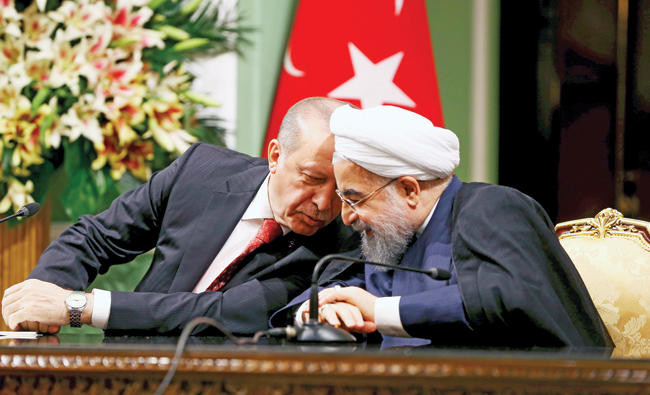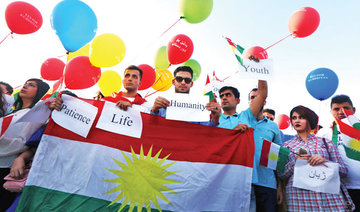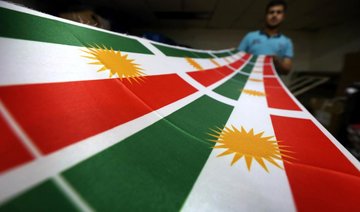ANKARA: Iraqi Kurdistan’s drive for independence and new efforts to end the conflict in Syria dominated talks in Tehran on Wednesday when Turkish President Recep Tayyip Erdogan began an official visit.
Erdogan met Iran’s supreme leader Ayatollah Ali Khamenei and President Hassan Rouhani, with cooperation on transport, trade, energy and border crossings also on the agenda.
Ankara and Tehran, with Russia, have driven the most recent peace efforts in Syria. They have established new cease-fire and de-escalation zones, and have deployed 500 observers each to monitor them.
Turkey and Iran also share borders with the Kurdistan Region of Iraq, and they vehemently opposed last month’s controversial referendum in which Kurds voted overwhelmingly in favor of independence. With Iraq, they fear that the vote will lead to greater regional instability and disrupt counter-terrorism efforts against Daesh.
The three countries are conducting military drills on the border in a show of force, and further punitive measures against the idea of an independent Kurdistan will follow, Erdogan said on Wednesday at a joint press conference with Rouhani. “There is no country in the world that recognizes it other than Israel. The decision made by sitting at the table with Mossad cannot be legitimate, it is illegitimate,” he said.
Rouhani said terror groups such as Daesh and the Kurdistan Workers’ Party (PKK) would not be allowed in the region, and Turkey and Iran supported the territorial integrity of both Syria and Iraq.
Two days before Erdogan’s visit, Turkish military Chief of Staff Gen. Hulusi Akar went to Tehran to meet his Iranian counterpart, Gen. Mohammed Hossein Bagheri, to discuss border security issues and joint efforts against terrorism.
During yesterday’s visit, Turkey and Iran also agreed to conduct bilateral trade through their own national currencies, in an effort to shore them up and reduce dependency on the US dollar.
“The Turkish lira went into free fall after the coup attempt last year, and President Erdogan has since pushed for trade in local currency, not only with Iran but also with other key trading partners such as Russia and China,” said Ahmad Majidyar, a fellow with the Middle East Institute in Washington.
“As far as Iran is concerned, existing US sanctions still limit Tehran’s access to dollars. As a result, the Iranian government seeks to establish its bilateral trade with key partners in local currency.”
The two countries also agreed to work more closely on mutual tourism to boost their economies, and Iran will make it easier for Turkish entrepreneurs to work there.
Three customs gates on the border between the countries will be now operational 24 hours a day with the aim of increasing bilateral trade volume from $10 to $30 billion, and Turkey will import more natural gas from Iran.
Convergence of interests and threat perception has compelled Tehran and Ankara to reconcile some of their differences and cooperate more to tackle regional challenges that threaten both countries, Majidyar told Arab News.
“Iran and Turkey both fiercely oppose the creation of an independent Kurdish state in Iraq as they fear such a move would strengthen separatism within their own sizable Kurdish minorities,” he said.
“Ankara has also realized that Washington is unwilling to take meaningful measures to topple the Assad regime or counter Iran’s influence in Iraq and Syria. Continued US support for Syrian Kurds has added to Ankara’s worries. As a result, Turkey is seeking to address some of its concerns by working with Iran, Russia and other regional and international players.”
However, despite a thaw in relations, there is still deep-seated mistrust between Tehran and Ankara and their transactional partnership in Syria and Iraq is unlikely to develop into a strategic alliance, Majidyar said.
Both countries perceive security threats from the instability that could arise from the Kurdish referendum, as this could result in a vacuum filled by terrorist groups such as the PKK and its Iranian offshoot the Kurdistan Free Life Party (PJAK), Prof. Nursin Atesoglu Guney, dean of the faculty of economics, administrative and social sciences at Bahcesehir Cyprus University in Iran, told Arab News.
“The relations between Turkey and Iran are therefore interest-based and can be labeled an alliance of convenience due to the common threat perception,” he said.
The geopolitical shift in the Middle East and Iran’s deteriorating relations with the West, mainly due to the impact of the Trump administration pressure on Tehran, also led to an improvement of relations between Turkey and Iran, Guney said.
“Throughout history, Turkey and Iran either cooperated on an issue-by-issue basis or got into competition in the region,” she said. “However, instead of competing in Syria, they found a window of opportunity to improve relations and go back to cooperation on a wide range of issues, from security to tourism and trade.”
Nevertheless, she did not expect joint military intervention by Turkey and Iran in the Kurdistan Region. “They can jointly take harsher measures, such as economic sanctions and an embargo on energy sources, but military action seems to be the last resort.”
Erdogan, Rouhani vow to halt Iraqi Kurds’ secession
Erdogan, Rouhani vow to halt Iraqi Kurds’ secession

Five Israeli soldiers killed in Gaza: military

- Statement: Two of the soldiers ‘fell during combat in the northern Gaza Strip’
- Latest round of negotiations on war in Gaza began on Sunday in Doha
JERUSALEM: Five Israeli soldiers were killed in combat in the northern Gaza Strip, Israel’s military said on Tuesday, as Israel and Hamas held indirect talks in Qatar on an elusive ceasefire.
Two of the soldiers “fell during combat in the northern Gaza Strip,” the Israeli military said in a statement, adding that three others were killed and two severely wounded in the same incident.
The wounded soldiers were “evacuated to a hospital to receive medical treatment and their families have been notified,” the military said.
The latest round of negotiations on the nearly two-year war in Gaza began on Sunday in Doha, with representatives of Israel and Palestinian militant group Hamas seated in different rooms in the same building.
Monday’s talks ended with “no breakthrough,” a Palestinian official familiar with the negotiations said.
The Hamas and Israeli delegations were due to resume talks, with US President Donald Trump’s special envoy Steve Witkoff also set to join them this week in an effort to secure a ceasefire.
The US proposal included a 60-day truce, during which Hamas would release 10 living hostages, taken during its October 2023 attack on Israel, and several bodies in exchange for Palestinians detained by Israel, two Palestinian sources close to the discussions earlier said.
Hamas was also demanding certain conditions for Israel’s withdrawal, guarantees against a resumption of fighting during negotiations, and the return of the UN-led aid distribution system, they said.
Trump hosts Netanyahu in push for Gaza deal

- Netanyahu was more cagey on peace with the Palestinians and ruled out a full Palestinian state, saying that Israel will ‘always’ keep security control over the Gaza Strip
- The US proposal included a 60-day truce, during which Hamas would release 10 living hostages and several bodies in exchange for Palestinians detained by Israel, two Palestinian sources close to the discussions had earlier told AFP
WASHINGTON: US President Donald Trump hosted Benjamin Netanyahu for dinner at the White House on Monday as he pressed the Israeli prime minister to end the devastating Gaza war.
Netanyahu’s third visit since Trump’s return to power comes at a crucial time, with the US president hoping to capitalize on the momentum from a recent truce between Israel and Iran.
“I don’t think there is a hold up. I think things are going along very well,” Trump told reporters at the start of the dinner when asked what was preventing a peace deal.
Sitting on the opposite side of a long table from the Israeli leader, Trump also voiced confidence that Hamas was willing to end the conflict in Gaza, which is entering its 22nd month.
“They want to meet and they want to have that ceasefire,” Trump told reporters at the White House when asked if clashes involving Israeli soldiers would derail talks.
The meeting in Washington came as Israel and Hamas held a second day of indirect talks in Qatar on an elusive ceasefire.
Netanyahu meanwhile said he had nominated Trump for the Nobel Peace Prize — the US president’s long-held goal — presenting him with a letter he sent to the prize committee.
“He’s forging peace as we speak, in one country, in one region after the other,” Netanyahu said.
But Netanyahu was more cagey on peace with the Palestinians and ruled out a full Palestinian state, saying that Israel will ‘always’ keep security control over the Gaza Strip.
“Now, people will say it’s not a complete state, it’s not a state. We don’t care,” Netanyahu said.
Several dozen protesters gathered near the White House as Trump and Netanyahu met, chanting slogans accusing the Israeli prime minister of “genocide.”
Trump has strongly backed key US ally and fellow conservative Netanyahu, lending US support in Israel’s recent war by bombing Iran’s key nuclear facilities.
But at the same time he has increasingly pushed for an end to what he called the “hell” in Gaza. Trump said on Sunday he believes there is a “good chance” of an agreement this coming week.
“The utmost priority for the president right now in the Middle East is to end the war in Gaza and to return all of the hostages,” White House Press Secretary Karoline Leavitt said.
Leavitt said Trump wanted Hamas to agree to a US-brokered proposal “right now” after Israel backed the plan for a ceasefire and the release of hostages held in Gaza in exchange for Palestinian prisoners.
The latest round of negotiations on the war in Gaza began on Sunday in Doha, with representatives seated in different rooms in the same building.
Monday’s talks ended with “no breakthrough,” a Palestinian official familiar with the negotiations told AFP. The Hamas and Israeli delegations were due to resume talks later.
Trump’s special envoy Steve Witkoff was due to join the talks in Doha later this week in an effort to get a ceasefire over the line.
The US proposal included a 60-day truce, during which Hamas would release 10 living hostages and several bodies in exchange for Palestinians detained by Israel, two Palestinian sources close to the discussions had earlier told AFP.
The group was also demanding certain conditions for Israel’s withdrawal, guarantees against a resumption of fighting during negotiations, and the return of the UN-led aid distribution system, they said.
In Gaza, the civil defense agency said Israeli forces killed at least 12 people on Monday, including six in a clinic housing people displaced by the war.
Of the 251 hostages taken by Palestinian militants during the October 2023 Hamas attack that triggered the war, 49 are still being held in Gaza, including 27 the Israeli military says are dead.
The war has created dire humanitarian conditions for the more than two million people in the Gaza Strip.
Hamas’s October 2023 attack resulted in the deaths of 1,219 people, mostly civilians, according to an AFP tally based on Israeli official figures.
Israel’s retaliatory campaign has killed at least 57,523 people in Gaza, also mostly civilians, according to the Hamas-run territory’s health ministry. The UN considers the figures reliable.
Trump says Hamas ‘want to have that ceasefire’ in Gaza

WASHINGTON: US President Donald Trump voiced his confidence Monday that Hamas was willing to agree a truce with Israel, as he met with Israeli Prime Minister Benjamin Netanyahu to push for an end to the Gaza war.
“They want to meet and they want to have that ceasefire,” Trump told reporters at the White House when asked if clashes involving Israeli soldiers would derail talks.
Libya authorities intercept over 100 migrants off coast

- Libya has been gripped by unrest since the 2011 overthrow and killing of longtime ruler Muammar Qaddafi in a NATO-backed uprising
TRIPOLI: Libyan authorities on Monday said they had intercepted 113 migrants off the country’s coast and recovered three bodies in separate operations over three days.
The bodies of three “illegal migrants of African nationalities” were discovered on a beach in Misrata, some 200 kilometers (125 miles) east of Tripoli, the Ministry of Interior said.
Also on Monday, security forces on a speedboat intercepted 54 migrants off Garabulli, 50 kilometers east of the capital Tripoli, the ministry added.
They were brought back to the capital’s port and handed over to the competent authorities, it said.
The day before, “as part of a plan to intensify maritime patrols during the summer,” 20 migrants “of various nationalities” were rescued off Zawiya, 45 kilometers west of Tripoli, the ministry said Sunday.
On Saturday, 39 migrants were intercepted off the eastern coast of Tripoli, the ministry reported, without providing further details about where they were found or their point of departure.
Libya has been gripped by unrest since the 2011 overthrow and killing of longtime ruler Muammar Qaddafi in a NATO-backed uprising.
It has become a hub for tens of thousands of migrants trying to reach Europe, risking their lives at sea.
Migrants intercepted by Libyan authorities — even in international waters before reaching the Italian coast, some 300 kilometers away — are forcibly returned to Libya and held in detention under harsh conditions frequently condemned by the United Nations.
Ending war in Gaza is ‘Trump’s utmost priority’

- Israel’s refusal to allow free and safe entry of aid is key sticking point in Doha truce talks
WASHINGTON: US President Donald Trump’s “utmost priority” is to end the war in Gaza and free hostages held by Hamas, the White House said on Monday before a crucial meeting with Israeli Prime Minister Benjamin Netanyahu.
Trump’s special envoy Steve Witkoff will this week travel to Qatar, where Israel and Hamas are holding indirect talks. Israel’s refusal to allow the free and safe entry of humanitarian aid into Gaza remains the main obstacle to progress in the ceasefire talks in Doha, Palestinian sources said. Mediators hosted two more rounds of discussions on Monday.
The US-backed proposal for a 60-day ceasefire envisages a phased release of hostages, Israeli troop withdrawals from parts of Gaza and discussions on ending the war entirely.
Hamas has long demanded a final end to the war before it would free remaining hostages, but Israel will not halt fighting until all hostages are free and Hamas dismantled. Trump said last week that he would be “very firm” with Netanyahu on the need for a speedy Gaza deal.
However, Israel has intensified its military campaign in Gaza and sharply restricted food distribution. “God willing, a truce will take place,” Mohammed Al-Sawalheh, 30, from Jabaliya in northern Gaza, said on Monday after another Israeli air strike. “We cannot see a truce while people are dying. We want a truce that will stop this bloodshed.”



















